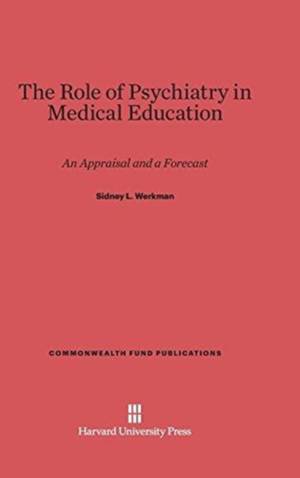
- Afhalen na 1 uur in een winkel met voorraad
- Gratis thuislevering in België vanaf € 30
- Ruim aanbod met 7 miljoen producten
- Afhalen na 1 uur in een winkel met voorraad
- Gratis thuislevering in België vanaf € 30
- Ruim aanbod met 7 miljoen producten
Omschrijving
This book describes and contrasts various psychiatric teaching programs in medical schools. After an examination of the differing and frequently unsatisfactory states of these programs, it also proposes a comprehensive plan for the future.
In preparing this study the author visited numerous medical schools, observing a wide range of teaching methods, goals, and facilities. His aim here is fourfold: to describe and compare existing medical school psychiatry programs in detail; to illustrate by example and anecdote the relation of teachers and students to these programs; to construct a synthesis of existing psychiatry programs that will offer optimum training and to outline a new program based on this synthesis and some additional proposals; and finally to show how methodology is a crucial but as yet unappreciated part of many psychiatry programs.
Dr. Werkman attempts to be a reporter in depth to his psychiatric colleagues about new and important developments in modern psychiatric teaching. The great scope and variety which the field of psychiatry has acquired since the Second World War has often meant that psychiatrists know little in detail of what their colleagues are doing. The author finds as well that there is often a lack of communication both within a single department and between departments in different medical schools, and that the attitude of many non-psychiatrists on the faculties ranges from ignorance to hostility--an attitude often reflected by the students.
Specificaties
Betrokkenen
- Auteur(s):
- Uitgeverij:
Inhoud
- Aantal bladzijden:
- 203
- Taal:
- Engels
- Reeks:
- Reeksnummer:
- nr. 40
Eigenschappen
- Productcode (EAN):
- 9780674593572
- Verschijningsdatum:
- 5/02/1966
- Uitvoering:
- Hardcover
- Formaat:
- Genaaid
- Afmetingen:
- 156 mm x 234 mm
- Gewicht:
- 467 g

Alleen bij Standaard Boekhandel
Beoordelingen
We publiceren alleen reviews die voldoen aan de voorwaarden voor reviews. Bekijk onze voorwaarden voor reviews.











